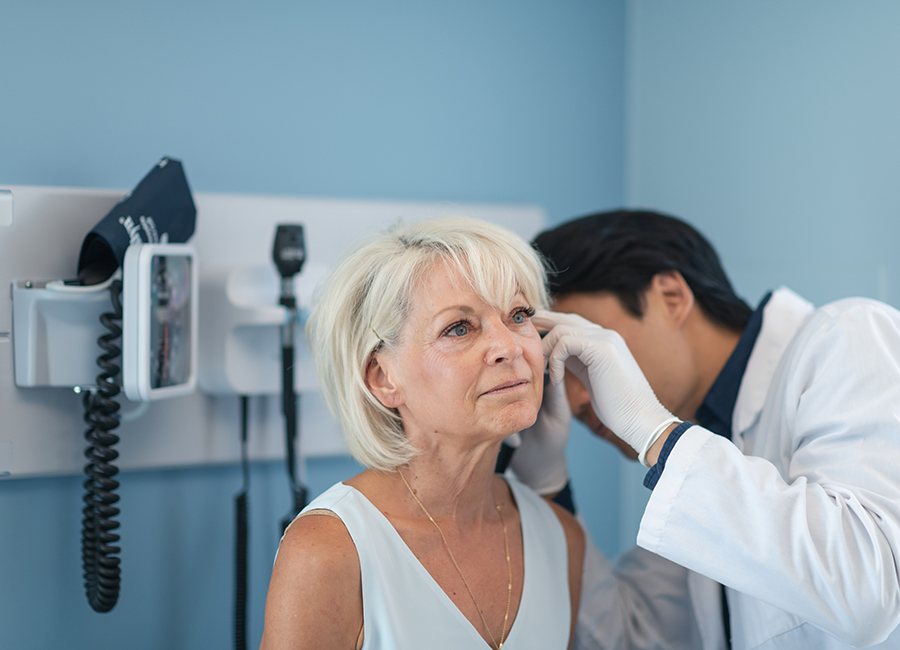Sudden Hearing Loss: Why It Happens and What to Do if It Happens to You

The ability to hear is one of our most important senses. In fact, Aristotle ranked it the second most important sense next to sight, because both are involved in sensing threats from a distance, making them critical for survival. 1
These days we probably don’t rely on our hearing for the same reasons we did back in the fourth century, B.C. But our ability to hear is still something that we use every day to take in important information about our surroundings and to enjoy everything the world around us has to offer.
And it’s definitely something we notice if it suddenly stops working.
Sudden hearing loss, also known as sudden deafness or sudden sensorineural hearing loss (SSHL), can happen to anyone, although it usually affects adults in their 50 and 60s. According to the Hearing Loss Association of America, it usually strikes one person in every 5000 each year.1
What causes sudden hearing loss?
Perhaps the most important thing to know about SSHL is that it is considered a medical emergency – at least until the underlying reason for the loss is diagnosed.
So, if you or someone you love loses all or part of your hearing all at once or over a period of about 24 hours or so, make sure to see your doctor as soon as possible to rule out any serious underlying conditions.
The good news is that viruses are the most common causes of SSHL and are easily treated, usually with steroids. Even impacted ear wax can be the culprit. But SSHL can also be caused by much more serious conditions like stroke, loss of blood flow to the inner ear, a ruptured membrane in the ear, Meniere’s disease, an autoimmune inner ear disease, or a tumor of the hearing nerve (which is quite rare). That’s why you should never delay seeking help.3

What should I do if I notice SSHL?
First of all, try to relax. Call your doctor, then remember that sudden hearing loss is usually caused by a medical condition that can be treated – and in mild cases it’s usually reversible.
But regardless of the cause of your hearing loss, time is of the essence. Don’t wait to make that call, because it’s critical to find out exactly what’s going on and get treatment started as soon as possible. Delaying can potentially impact the effectiveness of whatever treatment your doctor recommends, and increases the risk of permanent hearing loss.4 In fact you have about a 10- to 14-day window to treat SSHL before hearing loss becomes irreversible, so act quickly. 5
However, you don’t have to – and you shouldn’t – wait for a medical emergency before you start looking after your ears. Protect your hearing at all costs by wearing ear protection such as earmuffs or disposable or custom ear plugs in noisy environments, making sure you never exceed 60% of your device’s maximum volume for more than 60 minutes a day, and taking regular breaks if you do have to be in a loud space.
It’s also a good idea to prioritize your hearing and make it part of your self-care by getting your ears checked out by a hearing healthcare professional.
You can start today by taking advantage of a free, comprehensive hearing assessment and a free, 30-day hearing aid trial at a HearingLife clinic near you.
HearingLife forms the largest network of hearing clinics with over 350 network clinics across Canada. Staffed by certified hearing healthcare professionals, HearingLife offers the most advanced hearing aid technology and up-to-date diagnostic equipment, as well as clinical support and exclusive 360-AfterCare. #LoveYourEars and visit HearingLife to book an appointment for your free trial today.
SOURCES
1 https://www.discovermagazine.com/health/which-sense-do-humans-rely-on-the-most
2 https://www.hearingloss.org/hearing-help/hearing-loss-basics/sudden-deafness/
3 https://www.mountsinai.org/locations/center-hearing-balance/conditions/sudden-hearing-loss
4 https://www.health.harvard.edu/diseases-and-conditions/now-hear-this-dont-ignore-sudden-hearing-loss

